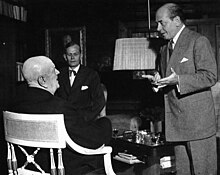Eugene Ormandy
Eugene Ormandy (born November 18, 1899 in Budapest , Austria-Hungary , † March 12, 1985 in Philadelphia , Pennsylvania , USA), whose real name was Jenő Blau , was an American conductor and violinist of Hungarian origin .
Life
Jenő Blau studied music at the Royal Hungarian Music Academy in Budapest . There he graduated as a violinist from Jenő Hubay at the age of 14 . At seventeen, after several tours, he became a professor at his old university, and in 1918 he became concertmaster of the Blüthner Orchestra in Berlin. After the defeat of the Hungarian Soviet Republic , he emigrated to the USA in 1921 - motivated by promises made by a dubious impresario.
There he took the name Eugene Ormandy. "Eugene" is the English equivalent of his Hungarian first name, but the origin of his last name could never be deciphered, especially since Ormandy himself did not comment on it. The luxury ship Normandie , with which he allegedly traveled to the USA and which is sometimes cited as a source of inspiration, was not put into operation until 1935. The maiden name of the mother's maiden name given by individual sources - Rosalie Ormandy Blau - cannot be proven beyond doubt.
In New York Ormandy met his compatriot Ernö Rapée , who initially hired him as a violinist for the Capitol Theater Orchestra, an orchestra that provided musical accompaniment to silent films . In a short time Ormandy advanced to the position of concert master there and finally became conductor of the orchestra in 1926. In the fall of 1931 Ormandy stepped in for Arturo Toscanini , who had to cancel guest conducting with the Philadelphia Orchestra due to illness. He was then appointed head of the Minneapolis Symphony Orchestra in 1931 , an office he held until 1936. His recordings of Anton Bruckner's 7th Symphony and Gustav Mahler's 2nd Symphony became famous . His career was mainly promoted by Arthur Judson, who was playing a major role in the American music scene at the time. From 1936 on, Ormandy was initially assistant and co-conductor of Leopold Stokowski at the Philadelphia Orchestra and two years later became chief conductor. The Philadelphia Orchestra built an excellent reputation under his leadership. Ormandy and the orchestra became one of the most recorded ensembles in recorded music history, with tours to Great Britain (1949), Finland (1955), Latin America (1966), Japan (1967) and China (1973). His style of interpretation went down in history as the "Philadelphia Sound". He directed the Philadelphia Orchestra until 1980. In 1977 he was accepted into the American Philosophical Society .
Ormandy has, among other things, given the world premieres of the violin concerto by Samuel Barber , the 3rd piano concerto by Béla Bartók , the 5th symphony by Howard Hanson , the 4th symphony by Bohuslav Martinů and the symphonic dances by Sergei Rachmaninow .
Ormandy received five Grammy Awards during his career and is immortalized on the Hollywood Walk of Fame . His burial place is in the Old Pine Street Presbyterian Church Cemetery in Philadelphia .
literature
- Richard Eldon Yaklich: The orchestral scores of Eugene Ormandy. Creating the "Philadephia Sound" . Edwin Mellen Press, Lewiston 2017, ISBN 978-1-4955-0584-3 .
- Phyllis W. Rodríguez-Peralta: Philadelphia Maestros. Ormandy, Muti, Sawallisch . Temple University Press, Philadelphia 2006, ISBN 1-59213-487-4 .
Web links
- Eugene Ormandy at Discogs (English)
Individual evidence
- ↑ José A. Bowen: Ormandy, Eugene [Blau, Jenő]. In: Grove Music Online (English; subscription required).
- ↑ a b c d Wolfgang Behrens: Ormandy, Eugene. In: Ludwig Finscher (Hrsg.): The music in past and present . Second edition, personal section, volume 12 (Mercadante - Paix). Bärenreiter / Metzler, Kassel et al. 2004, ISBN 3-7618-1122-5 ( online edition , subscription required for full access)
- ↑ Eugene Ormandy in the Munzinger archive , accessed on February 5, 2020 ( beginning of article freely accessible)
- ^ Robert L. Jones: Ormandy, Eugene in: American National Biography
- ↑ David Ewen: Dictators of the Baton . Alliance Book Corporation, Chicago, New York 1943, p. 199–200 ( archive.org [accessed February 5, 2020]).
- ↑ a b c Biography on: Eugene Ormandy Papers , University of Pennsylvania
- ^ Member History: Eugene Ormandy. American Philosophical Society, accessed February 5, 2019 .
| personal data | |
|---|---|
| SURNAME | Ormandy, Eugene |
| ALTERNATIVE NAMES | Blau, Jenő (maiden name) |
| BRIEF DESCRIPTION | American conductor and violinist of Hungarian origin |
| DATE OF BIRTH | November 18, 1899 |
| PLACE OF BIRTH | Budapest |
| DATE OF DEATH | March 12, 1985 |
| Place of death | Philadelphia , Pennsylvania , USA |
